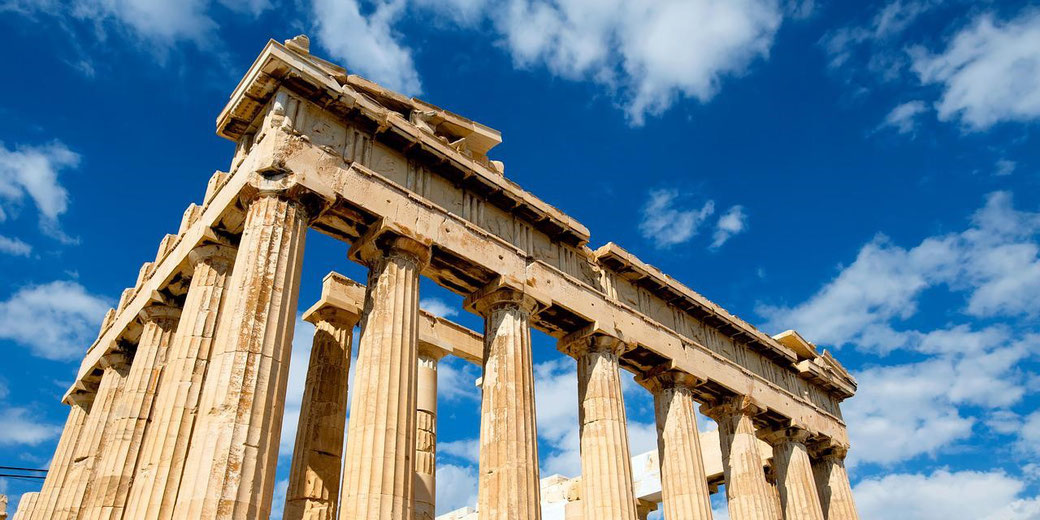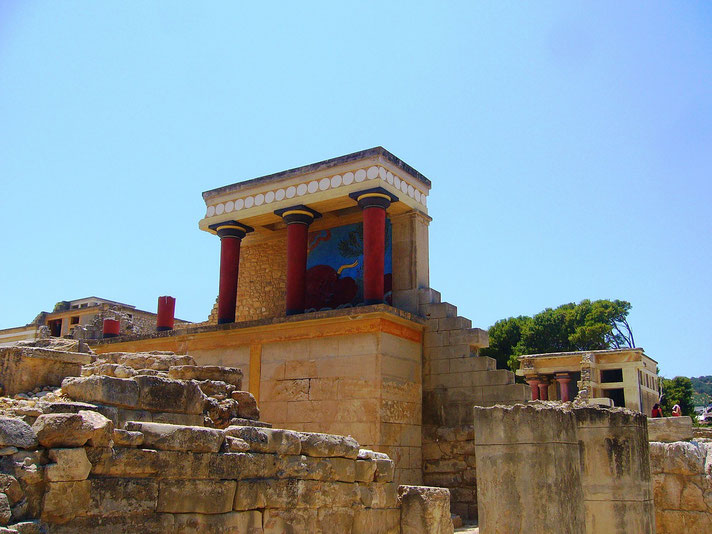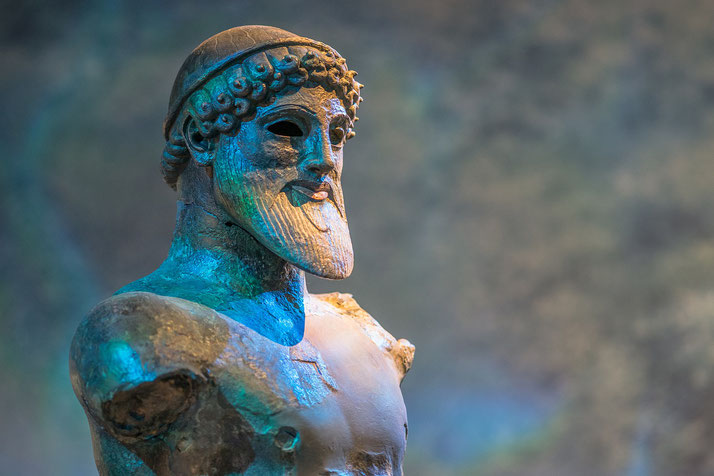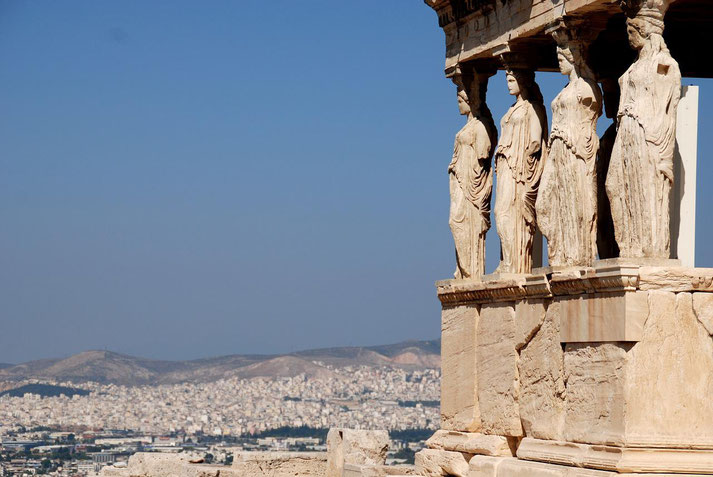From the Stone Age to Roman domination: The history of Ancient Greece

Ancient Greece is one of the most famous civilisations in all of European history. For almost 1000 years, it was a major cultural force in the Mediterranean region, and its legacy can be seen in the art, literature, philosophy, and politics of the modern world.
In this article, we will look at the key events in the history of ancient Greece.
Geography
Greece is a country in south-eastern Europe, known in Greek as Hellas. The English name 'Greece' comes from the Latin word 'Graecia', which means 'the land of the Greeks'.
The ancient Greece culture spread over a large area that including parts of the mainland of present-day Greece, as well as the Peloponnese peninsula.
Greece also includes an archipelago of islands, since the Mediterranean Sea surrounded ancient Greece on three sides.
As a result, the regions considered to be part of the Greek world included many islands, including Crete, Rhodes, and Cyprus.
The climate in ancient Greece was varied depending on the location. For example, it was typically hot and dry in the southern areas, while the northern areas were cooler and wetter.
In particular, Greece's landscape was typically made up of mountains, woods, and cultivated fields.
Although around 80 percent of the country is made up of mountains and a limited number of rivers cut through this rocky terrain.
Due to these factors, much of the land was not particularly suited for large scale agriculture to support city populations.
As a result, conflict between different city-states for control of natural resources was a common part of ancient Greek life.
What were the earliest Greek civilisations?
In the early Neolithic Age, the first farming societies began to develop in Greece in around 6000 BC.
These societies appear to have consisted of migrants from the region of Anatolia.
Such early civilisations were small, and they only grew enough crops for their own immediate needs.
However, it was the Minoans that were the first great civilisation in Greece. They lived on the island of Crete, and they flourished from around 2000-1450 BC.
It is often referred to as the Minoan civilisation because it was named after the mythical King Minos who was said to have ruled over Crete.
The Minoans became well-known for their artistry, especially in pottery and sculpture.
They also developed a mysterious and complex system of writing called Linear A, which has not yet been deciphered.
Eventually, the Minoan civilisation declined due to a range of factors, including a volcanic eruption on the island of Thera (Santorini).
This triggered a tsunami which caused by the eruption, which appears to have played an equally important role in causing widespread destruction across many Minoan settlements.
Then, in around 1400 BC, the next early Greek culture, known as the Mycenaean civilisation, began to develop in mainland Greece.
The Mycenaeans were influenced by the earlier Minoans, and they also developed a similar system of writing, called Linear B.
Unlike Linear A, this script has been successfully deciphered and has been shown to be an early form of the Greek language.
The Mycenaeans were a warlike people, and they are known for their magnificent palaces and fortifications.
However, just like the Minoans, the Mycenaean civilisation collapsed. This time, it seems that it was caused by economic decline, drought, and invasion.

The Greek Dark Age
Around 1100 BC, it is thought that the Dorian people invaded mainland Greece from the north.
They conquered the Mycenaean civilisation and ushered in a new period in Greek history, known as the Dark Ages.
It is called this because very little is known about what happened during this time and, as such, we are 'left in the dark' about important details.
It is thought that there was a significant decline in population and a decrease in trade due to collapse of the Mycenaean civilization.
However, archaeological evidence shows that progress was still being made during this time, including Greeks beginning to colonize small parts of Asia Minor.
Around 800 BC, the first signs of widespread recovery began to appear. At Delphi, in central Greece, a shrine dedicated to the god Apollo was built, and quickly became the most famous religious site in ancient Greece.
Known as the Delphic Oracle, it became a popular place for Greeks to seek advice from the god about their future and their day-to-day concerns.
The Archaic Period
The Archaic Period is the name given to the time period in Greece from around 800 to 480 BC.
It was during this time that the Greeks began to establish much more substantial colonies around the Mediterranean and Black Sea coasts.
The Greeks also started to develop their own form of government, art, and literature.
Some of the most famous pieces of Greek literature from this period are the Iliad and the Odyssey, both written by the poet Homer.
During the Archaic Period, political systems also began to change. Previously, monarchies had been the most common form of government across the Greek world.
However, during this time, city-states began to develop ideas that favoured a republican-style system which allowed more people to be involved in political life.
The most famous city-state was Athens, which developed the first version of democracy.

The Classical Period
This was followed by the Classical Period, which lasted from around 480 to 323 BC. This is often referred to as the 'golden age' of ancient Greece.
The Greeks continued to expand their empire and their influence spread throughout Europe and Asia.
Greek art, literature, and culture was at its peak during this period.
Most importantly, it saw the rise of Athens following the Persian defeat in 480 BC at the end of the Persian Wars.
The defeat brought about a period of peace and prosperity, and culture grew due to improved finances and stability.
The city-state of Athens, which possessed a powerful navy, was able to demand and enforce tributes from other city-states.
As a result, Athens established the Delian League in 478 BC, a defensive alliance whose stated goal was to hinder future Persian invasions.
However, Sparta became worried about the Athenians and established its own organization for protection against their rivals: the Peloponnesian League (named after the Peloponnese region where Sparta and the other cities were located).
The city-states that sided with Sparta began to see Athens as a threat to peaceful cooperation between the Greeks.
These two groups eventually clashed in the Peloponnesian War, which lasted from 431 to 404 BC.
This conflict was fought between Athens and Sparta, with each side invading the other's territories and allies.
Ultimately, the war resulted in the defeat of Athens and the end of its empire.
Despite losing the war, Athens remained an important center of culture and philosophy.
In contrast, Sparta became the dominant military power in Greece, but it was short-lived.
In 371 BC, Thebes defeated Sparta at the Battle of Leuctra and ended its reign.

Alexander the Great and the Hellenistic Period
After the rise of Thebes, there were a number of wars between different city-states in Greece.
These wars led to the rise of Macedon, a powerful state in the north of Greece.
Macedon was ruled by Alexander the Great's father, Philip II. In 338 BC, Philip II conquered almost all of the city-states in Greece and established the League of Corinth.
This made Macedonia the most powerful state in Greece. However, Philip then died, and his son took the throne.
Then, in 334 BC, Alexander the Great, invaded Persia. This was a massive empire that included present-day Turkey, Iran, and Egypt.
Alexander conquered all of these territories and established the largest empire in the world at that time, reaching as far east as India.
The rapid spread of Alexander's kingdom also facilitated the spread of Greek culture throughout the eastern Mediterranean world.
After Alexander's death in 323 BC, his empire was divided up between his generals.
As a consequence, Ancient Greece entered a period of decline during the Hellenistic Period.
The Hellenistic Period is the name given to the time from around 323 to 31 BC.
For almost 300 years, competing Greek kingdoms exhausted themselves trying to defeat each other.
The Roman Period
Ancient Greece finally came to an end around 146 BC when the Roman Empire conquered most of the region.
The key moment occurred in 31 BC, when the Roman emperor Augustus defeated the last Greek kingdom: Egypt, ruled by Cleopatra.
This effectively ended Greek independence as Rome became the dominant power in the Mediterranean.
Ultimately, Greece was made a province of Rome until the Roman Empire also fell over 400 years later.
While ancient Greece technically came to an end with the Roman conquest, Greek culture continued to influence the world for many centuries afterwards.
In fact, the Romans adopted much of Greek culture and spread it throughout their own empire.
And even today, we can still see the influence of ancient Greece in our own culture.
From art and architecture to literature and philosophy, the legacy of ancient Greece continues to live on.
Further reading
What do you need help with?
Download ready-to-use digital learning resources
Copyright © History Skills 2014-2025.
Contact via email
With the exception of links to external sites, some historical sources and extracts from specific publications, all content on this website is copyrighted by History Skills. This content may not be copied, republished or redistributed without written permission from the website creator. Please use the Contact page to obtain relevant permission.





